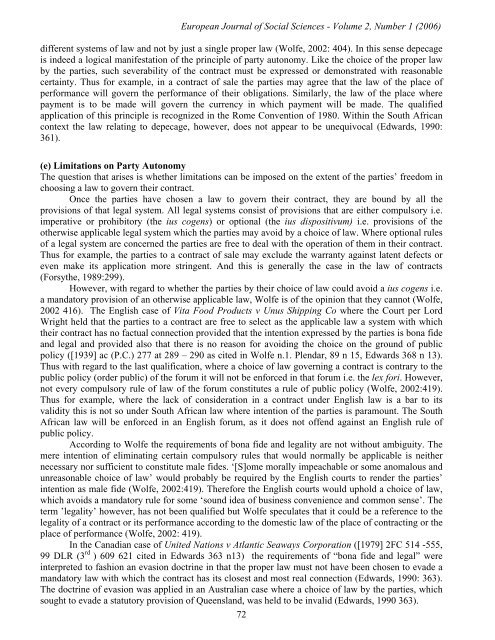EFFECT OF VITAMINS C AND E INTAKE ON BLOOD ... - EuroJournals
EFFECT OF VITAMINS C AND E INTAKE ON BLOOD ... - EuroJournals
EFFECT OF VITAMINS C AND E INTAKE ON BLOOD ... - EuroJournals
Create successful ePaper yourself
Turn your PDF publications into a flip-book with our unique Google optimized e-Paper software.
European Journal of Social Sciences - Volume 2, Number 1 (2006)<br />
different systems of law and not by just a single proper law (Wolfe, 2002: 404). In this sense depecage<br />
is indeed a logical manifestation of the principle of party autonomy. Like the choice of the proper law<br />
by the parties, such severability of the contract must be expressed or demonstrated with reasonable<br />
certainty. Thus for example, in a contract of sale the parties may agree that the law of the place of<br />
performance will govern the performance of their obligations. Similarly, the law of the place where<br />
payment is to be made will govern the currency in which payment will be made. The qualified<br />
application of this principle is recognized in the Rome Convention of 1980. Within the South African<br />
context the law relating to depecage, however, does not appear to be unequivocal (Edwards, 1990:<br />
361).<br />
(e) Limitations on Party Autonomy<br />
The question that arises is whether limitations can be imposed on the extent of the parties’ freedom in<br />
choosing a law to govern their contract.<br />
Once the parties have chosen a law to govern their contract, they are bound by all the<br />
provisions of that legal system. All legal systems consist of provisions that are either compulsory i.e.<br />
imperative or prohibitory (the ius cogens) or optional (the ius dispositivum) i.e. provisions of the<br />
otherwise applicable legal system which the parties may avoid by a choice of law. Where optional rules<br />
of a legal system are concerned the parties are free to deal with the operation of them in their contract.<br />
Thus for example, the parties to a contract of sale may exclude the warranty against latent defects or<br />
even make its application more stringent. And this is generally the case in the law of contracts<br />
(Forsythe, 1989:299).<br />
However, with regard to whether the parties by their choice of law could avoid a ius cogens i.e.<br />
a mandatory provision of an otherwise applicable law, Wolfe is of the opinion that they cannot (Wolfe,<br />
2002 416). The English case of Vita Food Products v Unus Shipping Co where the Court per Lord<br />
Wright held that the parties to a contract are free to select as the applicable law a system with which<br />
their contract has no factual connection provided that the intention expressed by the parties is bona fide<br />
and legal and provided also that there is no reason for avoiding the choice on the ground of public<br />
policy ([1939] ac (P.C.) 277 at 289 – 290 as cited in Wolfe n.1. Plendar, 89 n 15, Edwards 368 n 13).<br />
Thus with regard to the last qualification, where a choice of law governing a contract is contrary to the<br />
public policy (order public) of the forum it will not be enforced in that forum i.e. the lex fori. However,<br />
not every compulsory rule of law of the forum constitutes a rule of public policy (Wolfe, 2002:419).<br />
Thus for example, where the lack of consideration in a contract under English law is a bar to its<br />
validity this is not so under South African law where intention of the parties is paramount. The South<br />
African law will be enforced in an English forum, as it does not offend against an English rule of<br />
public policy.<br />
According to Wolfe the requirements of bona fide and legality are not without ambiguity. The<br />
mere intention of eliminating certain compulsory rules that would normally be applicable is neither<br />
necessary nor sufficient to constitute male fides. ‘[S]ome morally impeachable or some anomalous and<br />
unreasonable choice of law’ would probably be required by the English courts to render the parties’<br />
intention as male fide (Wolfe, 2002:419). Therefore the English courts would uphold a choice of law,<br />
which avoids a mandatory rule for some ‘sound idea of business convenience and common sense’. The<br />
term ’legality’ however, has not been qualified but Wolfe speculates that it could be a reference to the<br />
legality of a contract or its performance according to the domestic law of the place of contracting or the<br />
place of performance (Wolfe, 2002: 419).<br />
In the Canadian case of United Nations v Atlantic Seaways Corporation ([1979] 2FC 514 -555,<br />
99 DLR (3<br />
72<br />
rd ) 609 621 cited in Edwards 363 n13) the requirements of “bona fide and legal” were<br />
interpreted to fashion an evasion doctrine in that the proper law must not have been chosen to evade a<br />
mandatory law with which the contract has its closest and most real connection (Edwards, 1990: 363).<br />
The doctrine of evasion was applied in an Australian case where a choice of law by the parties, which<br />
sought to evade a statutory provision of Queensland, was held to be invalid (Edwards, 1990 363).
















